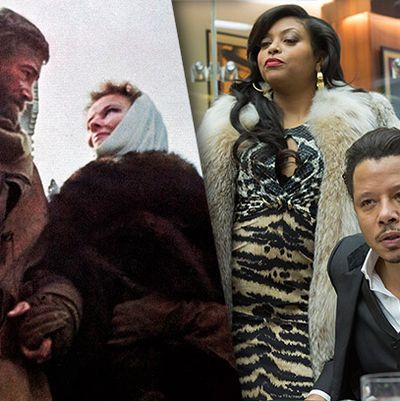
Since its astonishingly high-rated debut last Wednesday, people have been referring to the new Fox nighttime soap Empire as a hip-hop King Lear. This is mainly because one of the characters sarcastically asks in the pilot, “We King Lear now?”
With only one episode (which I recapped) under its snakeskin belt, Empire appears to take pride in melding the classic with the contemporary (notice the Kehinde Wiley paintings that are all around the episode, which show African-American men in historic, heroic poses). But as much as creators Lee Daniels and Danny Strong obviously pick up a few things from the immortal Shakespeare tragedy, the text the show really owes its plot to is The Lion in Winter. C’mon, the family’s last name is Lyon, for chrissake!
Even Strong has admitted that Lion is just as key an influence as Lear. “The whole idea just flooded through my head,” he told Entertainment Weekly. “I’d do it like King Lear or The Lion in Winter. Make the main character like a dying king, and he’s got three sons.”
While Lear goes back centuries, Lion only goes back several decades. Penned by the late author and playwright James Goldman (he’s also the brother of legendary Butch Cassidy and the Sundance Kid screenwriter William Goldman), Lion was brought to the Broadway stage in 1966, with Robert Preston as a power-mad Henry II of England and Rosemary Harris as his imprisoned wife, Eleanor of Aquitaine. Set during Christmas of 1183, Henry gives his old lady some time off to spend with him and his three sons, who are all chomping at the bit to take over their dad’s throne once he’s gone. Lion even gives a shout-out to Shakespeare’s play in the opening minutes, as Henry notes he has a lot in common with “a legend of a king called Lear.”
The play was eventually adapted for the screen twice. In 2003, Showtime delivered a version directed by Andrei Konchalovsky, whose credits include co-writing Andrei Rublev and directing Tango & Cash, with Patrick Stewart and Glenn Close in the leads. But the version that’s most iconic is the adaptation that was done in 1968. It was only the second film helmed by Anthony Harvey (who edited Lolita and Dr. Strangelove for Stanley Kubrick), who had the daunting task of directing Peter O’Toole and Katharine Hepburn in the lead roles, not to mention a young Anthony Hopkins as the oldest son.
It appears Harvey did an exemplary job, considering that Lion was one of the highest-grossing movies of 1968 and later went on to win three Academy Awards, including an Oscar for Hepburn. (The character of Eleanor is an instant award-grabber for anyone who assumes the role: Harris won a Tony when she played her on Broadway, and Close received a Golden Globe for her performance in the TV version.) It also helps that Goldman didn’t skimp on the sharp-tongued, conflict-heavy narrative. The family, cynical manipulators, each and every one, basically spend Christ’s birthday plotting and scheming on each other. They try to outmaneuver and one-up one each other to the point where a showdown involving weaponry is most inevitable.
The bitter bastard in me finds Lion to be one awesome movie to watch during Christmastime. One viewing of O’Toole and Company slinging daggers both verbal (“What should we hang — the holly or each other?” O’Toole asks his clan) and physical, and you may never complain about going back home for the holidays ever again. Then again, it also might make dysfunctional-family offspring feel homesick.
Daniels and Strong certainly stripped a lot of Lion for parts as they were developing Empire. Henry isn’t on the outs like the ALS-stricken Lucious, but he is thinking about the future and his own mortality. And just as Lucious favors baby boy Hakeem over his other sons in Empire, Henry wants his youngest, John (Nigel Terry), an obnoxious brat who favors his old man over his momma, to be his successor. They switch things up with the other brothers. While big bro Andre is the calculating brother on the show, it’s unappreciated middle child Geoffrey (John Castle) who is making the Machiavellian moves in Lion. And as Cookie loves gay middle child Jamal the most, Hopkins’s Richard is the closeted apple of his momma’s eye.
Although she can be just as devious as her king (whom she still holds a torch for, even though he imprisoned her for ten years) and admits that her kids can be loathsome creatures, Eleanor eventually tires of the drama and wants her family to reach some kind of peaceful agreement. She even tries to convince Alais (Jane Merrow), Henry’s young, always-on-the-precipice-of-scorn mistress, that she harbors no ill will toward the girl. (Over on Empire, Cookie immediately shows she has no love for Lucious’s new squeeze.)
Daniels and Strong definitely went about making Cookie just as strong, confident, and immensely sympathetic a character as Eleanor. Just sprung out of jail for 17 years for drug-dealing, Cookie immediately shows up demanding a piece of the business she helped create with Lucious — which, as Daniels and Strong established in flashbacks where Cookie gives musical advice to Lucious, we see she’s quite in the right about. But she also wants to connect with her boys, trying to instill some sort of humanity in the three men who’ve now grown up embittered and confused under their father’s care.
The Lion in Winter is a riveting, relatable look at a dysfunctional family immersed in turmoil. And while Empire appears to be a darker-skinned, melodramatic, amusingly ratchet facsimile, they both ultimately echo the same sentiment: Yes, families can be bat-shit crazy, but you’re still all stuck together.

